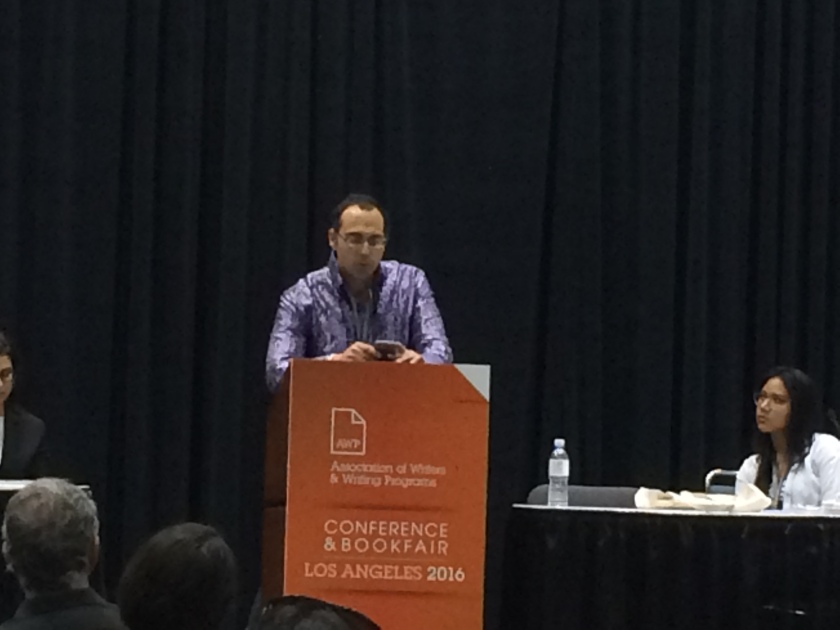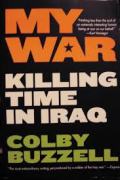
With at least twelve events featuring authors who have written about deployment to Iraq and Afghanistan, the recent Association of Writers and Writing Program conference offered plenty of opportunity to assess the public face of war writing while also catching up with fellow members of the war writing community. Within an hour of arrival, for example, I was trading stories with Colby Buzzell, whom I had never met before, at a taco food truck near the Los Angeles Convention Center, the site of the conference this year. AWP, as the conference is called, was full of such moments for me, and, I suspect, many others. The panel presentations and readings were excellent, and just as rewarding were the off-stage conversations with old and new friends.
Notions of inclusion and expansion characterized the war-writing panels, as many were specifically designed to showcase authors who were not white male combat veterans writing lugubrious sagas of self. All to the good, and I’m eager now to read authors such as Qais Akbar Omar, a former Afghan interpreter who has written a memoir titled A Fort of Nine Towers; Vicki Hudson, a former MP officer whose creative and non-fiction writing begins to redress the glaring omission of LBGT voices in the war-writing field; and Mary Doyle, a former Army NCO who’s now a prolific author of military-and-deployment accented detective fiction. A panel on memoir featured Kayla Williams, maybe the first female Iraq veteran to write a memoir (she’s now written two), and Angie Ricketts, who has written about the cloistered world of infantry officer wives suffering through their husbands’ multiple deployments. Elsewhere, I was delighted to hear Mariette Kalinowski read fiction that originated in her service as a gunner on Marine convoys in Iraq; Philip Metres read poetry about Abu Ghraib from his volume Sand Opera; and ex-Marine playwright Maurice Decaul speak of his efforts to produce plays written, performed, and staged by veterans.

The war writing interest in diversity coincided somewhat uneasily with a larger AWP concern this year with matters of race. Touchstones included the furor over the removal of Vanessa Place from the AWP selection committee because of her alleged insensitivity (in the name of fighting racism) about issues important to black Americans, Claudia Rankine’s keynote speech, which targeted the literary world for its implicit racism, and a Ruth Ellen Kocher blog post documenting two demeaning incidents at AWP that reinforced her impression that even among progressive-minded white writers, her black skin signifies second-class citizenship. Everyone who serves in the heavily-integrated military is race-conscious, though most of us like to think that the armed forces are free of, or at least freer of, the racial polarization that currently characterizes much of America. Evidence exists that corroborates this somewhat smug perception, but it is hardly appropriate for white veterans to pronounce definitively that all is well. The same issues surface in the war writing scene, too, with interesting permutations. Neither Mary Doyle nor Maurice Decaul, both black, make race a central concern in their writing about service and war. At her panel, Doyle actively resisted such categorization and explained that if anyone wants to know what really drives her literary bent, they should ask about her lifelong love for Dick Francis, the English author of detective novels set in the upper-crust world of horse-racing. A sweet AWP moment for me was eavesdropping while Doyle and Brian Turner reminisced about a shared deployment to Bosnia, proof that at least sometimes the peculiarly intense experience of service in the Army green machine overwhelms preoccupation with skin color. But it’s not as easy as that, nowhere near the last words on the matter, and I would love to hear Doyle’s and Decaul’s (or anyone’s) most developed thoughts about race and the military, and race and writing about war, should they be inclined to offer them. For what it’s worth, I have written a little more about the subject on this blog in a post titled Toni Morrison’s Home: The Africanist Presence in War Literature.
A second theme emerging out of the alchemy of public and private remarks was a sense that war-writing has matured as a publishing genre, which is to say that it is a much more commercial affair now than previously. Where once war writers were just happy to make it into print, many now are savvy practitioners of the business side of writing, where book deals are made and real money is on the line in the way of advances, foreign sales, next-book contracts, movie options, and ancillary speaking-and-writing gigs. As Jesse Goolsby noted, “The ‘off-page’ stuff can be as important as what’s on the page.” In separate events, Goolsby, Brian Castner, and Kayla Williams each spoke candidly and at-length about publishing—together the three might make a great panel at next year’s AWP titled “The Business of War Writing” (hint, hint). The two themes of diversification and professionalization intersected in frequent discussions about publishers’ receptivity to nontraditional war narratives. From my vantage point, publishing houses seem reasonably open to diverse perspectives, especially when rendered with a smidgeon of literary talent and verve. Things could always be better, of course, but the evidence so far suggests that it is readers, general readers, not the literary-minded ones, who perpetuate the popularity of books by and about young men who have performed bravely in combat, with best-selling titles such as American Sniper and Outlaw Platoon being the proof.
My contribution to AWP this year was to help organize two panels for which I also served as moderator. The first, Iraq Veteran-Writers Ten Years Later: Words After Words After War, featured four writers who all served in Iraq prior to 2005 and subsequently commenced lives largely organized around writing. Two authors, the aforementioned Colby Buzzell and Kayla Williams, were among the first veterans into print after 2003, while two others, Ron Capps and Maurice Decaul, have taken longer to find their writing voices and appreciative audiences. My intent here was to allow these interesting authors to take us back to their deployment days and then help us follow them forward as their thoughts about their service in Iraq coalesced and matured and their lives as writers evolved. Each had insightful ideas and anecdotes to speak of–why aren’t all AWP panels taped and archived? It’s impossible to reduce their common concerns to a sentence, but I sensed that Decaul and Williams are now exploring writing and life possibilities still deeply informed by early experience in Iraq, while Capps and Buzzell are more ready to move on, as if their deployment memories have now (perhaps thankfully) reached a half-life state of dissolve. Whatever these four authors do next, we’ll all be watching—it’s not just that they are “leaders” per se within the war-writing community, though they are, but that they now bring so much hard-earned gravitas to bear on any subject they choose to examine. More simply put, they’ve lived through more of life and life’s writing experiences than most of the rest of us.
Speaking of which–life–participants on the memoir panels spoke often about the problems of “life-writing,” which involves carefully modulating impulses toward self-promotion, self-disclosure, self-deception, self-deprecation, and even self-laceration. It took the panels featuring fiction to illustrate the insidiousness of this dynamic by portraying scenes too touchy to confess to in memoir. The aim of my second panel, New Directions in Contemporary War Literature, was to bring forth authors of novels about the military and war written within the last two years and see what reverberations their readings generated. I couldn’t have been happier with the result, the exact shape of which I didn’t see coming and which truth to tell was somewhat scary, though all the better for that.
Jesse Goolsby, the author of I’d Walk With My Friends If I Could Find Them, went first, choosing a passage from near the end of the novel in which one of the characters, Wintric Ellis, long after the war, sits in his car trying to work up the courage to kill the soldier who sexually assaulted him in Afghanistan. Early in the novel, Wintric participates in a shoot-or-don’t-shoot scenario in Afghanistan when he and his buddies are faced by a suicide bomber; now at the end of the novel it emerges that what has wrecked Wintric’s life was not enemy on the battlefield, but one nominally on his own side, and he must once more decide whether to kill someone or not. It’s a wrenching scene, similar in its way to Siobhan Fallon’s great short story “Leave,” and was beautifully read by Goolsby.
While Wintric deliberates, he fields a call from his wife, who wonders what he is up to. Wintric lies to her about his intentions, and it turns out that he has lied to her about other aspects of his deployment, too, more out of shame than meanness. Such deceit and cowardliness is hard to own up to in memoir, but the very stuff that fiction is good at portraying. Mendacity (to reference Cat on a Hot Tin Roof) also figures in Andria Williams’ The Longest Night, which dramatizes a real-life nuclear catastrophe that took place on an Army base in Idaho during the Cold War, while also offering startling astute portraits of the men who worked on the base and their families. Williams read an early scene foreshadowing the reactor meltdown and another longer one describing the mediocre career and desultory marriage of Master Sergeant Richards, a pompous senior NCO in charge of the reactor. The passage, told from the NCO’s wife’s point-of-view, is simultaneously devastating and funny-as-hell, and Williams’ reading, as did Goolsby’s, captivated the audience. The bigger import, alas, also had much in common with Goolsby’s: a military whose self-image is very badly out of sorts with its reality. Where there should be heroism, there’s folly; where leadership, selfishness; competency, dysfunction; loyalty, deceit; trust, contempt; camaraderie, betrayal; and faithfulness, infidelity.
If anything, the discrepancy between reality and appearance was heightened in the passage that Gallagher read from his novel Youngblood, one line of which went, “We were what we pretended to be.” The scene portrayed Youngblood hero Lieutenant Jack Porter as he makes a “blood money” reparations payment to the family of an Iraqi noncombatant they have killed. Porter finds himself adrift in a moral wasteland that puts him at odds not just with Iraqi values and customs, but also with the expectations of his men and his chain-of-command. Not trusting himself or anyone else, but performing, so to speak, on stage with all eyes on him, Lieutenant Porter must depend upon his wits to decode the swirl of ambiguous clues to determine what he should do and how he should feel. Many literary roads lead back to Melville, and as Gallagher read of Porter’s confusion I was reminded of Benito Cereno’s Amasa Delano, the Yankee ship captain who boards a slave ship on which the slaves have rebelled and taken control. As the slaves force the slave ship captain to pretend he is still in charge, Delano struggles to understand that the appearance of normality that the slaves have constructed for him is a fraud, as his powers of discernment, undermined by arrogance and false assumptions, prove far too weak to help him figure out the complicated situation he finds himself in. Critics have noted many references to the pretend world of theater in Benito Cereno, and much the same occurs in Youngblood, where really-real reality is continuously destabilized by Gallagher’s references to the stories, lies, myths, delusions, pretense, and other means of distortion and manipulation that purport to describe it.
The three readings, taken together, portrayed the complicated and often perverse flux of identity and play of truth inherent to life in uniform, with the authors in superb control of their material. If the message and tone were ominous, perhaps I’m making too much of it. Novels are imagined projections about how things might be, after all, not official pronouncements about the way things are. In any case, though, the story-writing talent on display set a high bar for the next round of novels about military and war. Two audience members, neither veterans, but the authors of many novels between them, told me the reading was the best event they attended at AWP. I was glad to hear that, but not too surprised, because I was pretty sure beforehand that it, like AWP itself, was going to be good.
Many thanks to all who made AWP so enjoyable this year. In addition to everyone named above I’ll mention Lauren and Colin Halloran, Jerri Bell, Benjamin Busch, Adrian Bonenberger, Jay Moad, Brandon Lingle, Carole Florman, Susan Derwin and Steven Venz, Tom Helscher, Justin Hudnall, Sylvia Ankenman Bowersox, Olivia Kate Cerrone, Julian Zabalbeascoa and his wife Kate, Lisa Sanchez, David Chrisinger, Christopher Robinson, Danuta Hinc, Christopher Meeks, all friends, family members, and fellow travelers, everyone I’ve forgotten, and last but not least Roxana Robinson for hanging out with us for a while and then saying such nice things on social media.







